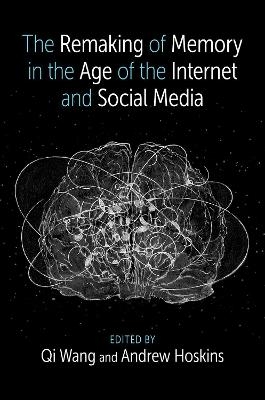
The Remaking of Memory in the Age of the Internet and Social Media
Oxford University Press Inc (Verlag)
978-0-19-766126-0 (ISBN)
- Lieferbar (Termin unbekannt)
- Versandkostenfrei innerhalb Deutschlands
- Auch auf Rechnung
- Verfügbarkeit in der Filiale vor Ort prüfen
- Artikel merken
In The Remaking of Memory in the Age of the Internet and Social Media, Qi Wang and Andrew Hoskins have assembled scholars from cognitive psychology, philosophy, neuroscience, and media and communication studies to synthesize emerging social and cognitive science research on the impact of the Internet and social media on remembering and forgetting. They probe whether human memory is being threatened by a shift from a healthy reliance to a dependency on digital media and technologies.
The book illuminates theoretical and empirical research which shows the consequences of human entanglements with the Internet and social media for memory representation, expression, and socialization in individuals and the implications for the family, community, and society.
Gathering the leading international scholars of Memory Studies together, this volume offers a new interdisciplinary agenda of inquiry into the digital remaking of individual, collective, and cultural memory.
Qi Wang is Joan K. and Irwin M. Jacobs Professor of Human Development, Psychology, and Cognitive Science at Cornell University. She is the author of The Autobiographical Self in Time and Culture (Oxford 2013), and Editor-in-Chief of the Journal of Applied Research in Memory and Cognition. Andrew Hoskins is Interdisciplinary Professor in Social Sciences at the University of Glasgow. He is founding Co-Editor-in-Chief of the Cambridge Journal of Memory, Mind & Media, founding Editor-in-Chief of the Sage Journal of Memory Studies, and founding Co-Editor of the Palgrave Macmillan book series Memory Studies.
Part I: Introduction
Chapter 1: The Internet Remaking of Memory: What Are the Important Questions?
-Qi Wang and Andrew Hoskins
Part II: The Digital Self in the Making
Chapter 2: The Online Extension of Autobiographical Memory: A Psycho-Cultural Perspective
-Qi Wang
Chapter 3: The Forgetting Ecology: Losing the Past Through Digital Media and AI
-Andrew Hoskins
Chapter 4: Sharing personal memories on social media: Motives and mnemonic consequences
-Charles B. Stone, Shayla Dockery, and Angelina N. Vasquez
Part III: The "GOOGLE EFFECT"?
Chapter 5: Varieties of Offloading Memory: A Framework
-Evan F. Risko, Megan O. Kelly, Xinyi Lu, and April E. Pereira
Chapter 6: The Changing Dynamics and Consequences of Memory Retrieval in the Age of the Internet
-Benjamin C. Storm, Dana-Lis Bittner, and Jeremy Yamashiro
Chapter 7: Photography, Digital Media and Technology: Moving from Effects on Memory to Entanglements in Remembering Activity
-Tim Fawns
Part IV: Fake News and False Memories
Chapter 8: Memories for public events in the Internet age: Fake news, false memories, and filter bubbles
-Gillian Murphy, Rebecca Egan, and Ciara M. Greene
Chapter 9: Continued Influence of Misinformation and the Information Disorder
-Li Qian Tay and Ullrich K. H. Ecker
Chapter 10: Is it possible for justice to be blind when social media is everywhere?
-Heather M. Kleider-Offutt and Beth B. Stevens
Chapter 11: Fake History: Digital Memory and the Specter of National Socialism in the Capital Riot
-Jennifer Evans and Brandon Rigato
Part V: Remembering Through the Individual and the Net
Chapter 12: Exploring Online Social Interactions in the Remaking of Memory
-Suparna Rajaram
Chapter 13: When Memories Become Data
-Rik Smit
Chapter 14: Between Coping and Commodification: Nostalgic Remembering in a Connected World
-Katharina Niemeyer and Emily Keightley
Part VI: From the Person to the Community and Society
Chapter 15: Hybrid Methodologies for Studying Social and Cultural Memory in the Post-Digital Age
-Samuel Merrill
Chapter 16: Weaponization of Memory: Viruses and Affective Resonance
Martin Pogacar
Chapter 17: Understanding Holocaust Memory on Instagram and TikTok
Noam Tirosh
Chapter 18: Remembering in pandemic time: A digital museum's 'slow memory' work
Karen Worcman and Joanne Garde-Hansen
Part VII: Concluding Remarks
Chapter 19: "Don't Panic": Navigating the New World of Memory's Remaking
-Louis Klein & Amanda Barnier
| Erscheinungsdatum | 30.10.2024 |
|---|---|
| Zusatzinfo | 15 b/w figures; 3 tables |
| Verlagsort | New York |
| Sprache | englisch |
| Maße | 170 x 238 mm |
| Gewicht | 640 g |
| Themenwelt | Geisteswissenschaften ► Psychologie ► Allgemeine Psychologie |
| Geisteswissenschaften ► Psychologie ► Biopsychologie / Neurowissenschaften | |
| Geisteswissenschaften ► Psychologie ► Persönlichkeitsstörungen | |
| Geisteswissenschaften ► Psychologie ► Sozialpsychologie | |
| Geisteswissenschaften ► Psychologie ► Verhaltenstherapie | |
| ISBN-10 | 0-19-766126-2 / 0197661262 |
| ISBN-13 | 978-0-19-766126-0 / 9780197661260 |
| Zustand | Neuware |
| Informationen gemäß Produktsicherheitsverordnung (GPSR) | |
| Haben Sie eine Frage zum Produkt? |
aus dem Bereich


